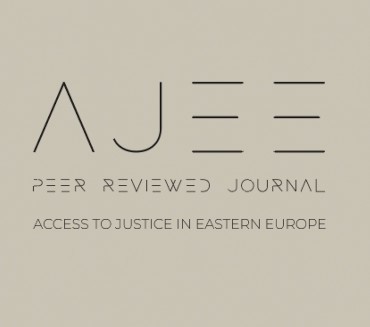1. Introduction. – 2. Facts of the Case. – 3. Legal Framework and Theoretical Analysis. – 4. Courts’ Practice. – 5. Concluding Remarks.

1. Introduction. – 2. Facts of the Case. – 3. Legal Framework and Theoretical Analysis. – 4. Courts’ Practice. – 5. Concluding Remarks.
Background: The article thoroughly examines the efficacy of constitutional complaints within Ukraine, utilising the Skrypka case as a pivotal illustration. Through comprehensive scrutiny, the authors analysed factual circumstances, national legislative frameworks governing contentious legal issues, and judicial precedents pertinent to the Skrypka case. The authors’ contention revolves around the primary role of a constitutional complaint in safeguarding an individual's violated constitutional rights, concurrently serving to fortify the constitutional order of the state.
Methods: To comprehensively understand the subject, the authors conducted an in-depth review of relevant court decisions, meticulously analysing the legal arguments presented by judges. Additionally, they examined the positions of knowledgeable scholars to identify and comprehend the current expert assessments and proposals.
Results and Conclusions: Through an in-depth review of judicial practices, the article delineates three predominant perspectives regarding the influence of decisions emanating from Ukraine's Constitutional Court subsequent to constitutional complaint reviews on the reevaluation of conclusive court decisions in specific cases: (1) The decisions of the Constitutional Court of Ukraine cannot impact contested legal relationships because these relationships existed prior to the adoption of these decisions by the Constitutional Court of Ukraine; (2) Review under exceptional circumstances is applicable only to decisions where the claims have been fully or partially satisfied (i.e., are subject to execution) but have not yet been enforced; (3) The decisions of the Constitutional Court of Ukraine are primarily significant as rulings of a general nature, establishing legal conclusions for resolving future cases.
Terletskyi Dmytro
PhD (Law), Head of the Constitutional Law Department, National University “Odesa Law Academy”, Odesa, Ukraine terletskyi@onua.edu.ua
https://orcid.org/0000-0003-4588-7517
Corresponding author, responsible for the conceptualization, research methodology, writing and supervising, and responsible for ensuring that the descriptions and the manuscript are accurate and agreed upon by the co-author.
Competing interests: No competing interests were declared.
Disclaimer: The author declares that his opinion and views expressed in this manuscript are free of any impact of any organizations.
Nehara Rodion
PhD (Law), Associate Professor of the Department of Administrative and Financial Law, National University “Odesa Law Academy”, Odesa, Ukraine
negara@onua.edu.ua
https://orcid.org/0000-0003-3942-708X
Co-author, responsible for writing and data collection.
Competing interests: No competing interests were declared.
Disclaimer: The author declares that his opinion and views expressed in this manuscript are free of any impact of any organizations.
Managing editor – Dr. Olha Dunaievska. English Editor – Julie Bold.
Copyright: © 2024 Dmytro Terletskyi and Rodion Nehara. This is an open access article distributed under the terms of the Creative Commons Attribution License, (CC BY 4.0), which permits unrestricted use, distribution, and reproduction in any medium, provided the original author and source are credited.
1. Barabash Yu, ‘“Means for the Protection of Rights vs Legal Certainty” as a Dilemma of the Domestic Official Constitutional Doctrine in the Context of Functioning of the Institute of Individual Constitutional Complaint’ (2020) 4 Ukrainian Journal of Constitutional Law 47, doi:10.30970/jcl.4.2020.2.
2. Barabash Yu and Berchenko H, ‘The Effectiveness of Individual Constitutional Complaint as a Means of Protecting the Rights of Individual in Ukraine’ (2021) 5 Bulletin of the Constitutional Court of Ukraine 9.
3. Berchenko H, Maryniv A and Fedchyshyn S, ‘Some Issues of Constitutional Justice in Ukraine’ (2021) 4(2) Access to Justice in Eastern Europe 128, doi:10.33327/AJEE-18- 4.2-n000064.
4. Pleskach V, ‘Effectiveness of the Constitutional Complaint as a Domestic Remedy in the Practice of the European Court of Human Rights’ (2020) 1 Ukrainian Journal of Constitutional Law 38, doi:10.30970/jcl.1.2020.4.
5. Riznyk SV, Constitutionality of Legal Acts: Essence, Evaluation Methodology and Providing System in Ukraine (Ivan Franko National University of Lviv 2020).
6. Savchyn M, ‘Doctrinal Issues of Introduction of the Constitutional Complaint in Ukraine’ (2018) 12 Law of Ukraine 39, doi:10.33498/louu-2018-12-039.
7. Terletskyi D, ‘Legally Significant Implications of the Decisions of the Constitutional Court of Ukraine in Criminal Proceeding’ (2020) 4 Ukrainian Journal of Constitutional Law 101, doi:10.30970/jcl.4.2020.6.
8. Terletskyi D, ‘The Effect of Decisions Passed by the Constitutional Court of Ukraine over Time: Theoretical and Practical Aspects’ in Smokovych M and (eds), Legal Consequences of Determining a Normative Act Unconstitutional for the Protection of Human Rights in Administrative Justice Process: Collection of the Workshop Materials, Kyiv, 31 July 2020 (Pravo 2020) 81. 9. Terletskyi DS, ‘The Case of Skrypka as an Epitome of the Effectiveness of Constitutional Complaint in the National Legal Order’ in Kivalov SV (ed), European Benchmarks for Ukraine's Development in the Context of War and Global Challenges of the 21st Century: Synergy of Scientific, Educational, and Technological Solutions: Materials of the International scientific and practical conference, Odesa, 19 May 2021 (Jurydyka 2021) vol 1, 270.
10. Yezerov A, ‘Unconstitutionality of the Law as a Basis for Review of Court Decisions in Exceptional Circumstances in Administrative Proceedings’ (2020) 3 Bulletin of the Constitutional Court of Ukraine 112.